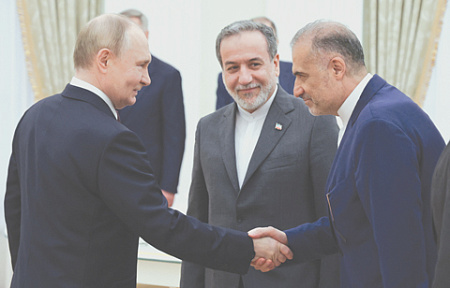
Russia will not intervene militarily on behalf of Iran in the escalating Middle East conflict, despite unequivocally condemning Israel and the United States. This position of calculated neutrality became apparent following high-level talks in Moscow, even as the conflict itself intensifies. U.S. President Donald Trump is now hinting that the war’s objective may extend to regime change in Tehran, while Iran threatens to deploy its most potent economic weapon: a blockade of the crucial Strait of Hormuz.
The diplomatic landscape was highlighted during a Moscow visit by Iranian Deputy Foreign Minister Abbas Araghchi. In the portion of the meeting open to the press, Russian President Vladimir Putin and Araghchi presented a united front, with Putin decrying the “completely unprovoked aggression against Iran.” According to the Kremlin, the discussions focused on pathways toward a peaceful resolution. However, the core takeaway is that while Moscow offers political condemnation, it is carefully avoiding direct military entanglement.
This stance aligns with the terms of the strategic partnership treaty between Moscow and Tehran, which, unlike Russia’s recent pact with North Korea, contains no mutual defense clause. The agreement primarily obligates Russia not to allow its territory to be used for an attack on Iran or to support such an attack—a commitment the Kremlin has maintained. Tehran had previously emphasized that the treaty was not a military alliance, seemingly content with this level of Russian support.
Meanwhile, the conflict is developing its own dangerous momentum. Tehran has thus far refrained from directly attacking U.S. targets in response to strikes on its nuclear facilities, a move analysts see as a calculated effort to avoid unifying the American public behind Trump. However, Iran has shown no such restraint toward Israel, which faces daily missile barrages. Notably, Tehran’s broader “Axis of Resistance”—its network of proxy militias across the region—has remained largely on the sidelines, with groups like Hezbollah showing little offensive activity.
The most vocal of Iran’s allies have been Yemen’s Houthi rebels, who declared that any U.S.-Houthi understandings are now void and have threatened to resume attacks on American vessels in the Red Sea. Concurrently, Israel continues its own strikes within Iran, reportedly targeting key facilities like the Fordow nuclear plant. The effectiveness of these attacks remains a subject of debate, with some reports suggesting Iran may have preemptively moved its stockpile of highly enriched uranium.
The conflict’s next major escalation could be economic. The Iranian parliament has openly advocated for closing the Strait of Hormuz, a chokepoint for a significant portion of global oil exports. Such a move would likely cause a dramatic spike in oil prices, impacting the U.S. economy. In response, Trump has urged American oil producers to increase output while doubling down on his rhetoric, coining the phrase “Make Iran Great Again” (MIGA) to signal his goal of a new government in Tehran. This narrative was amplified by Reza Pahlavi, the son of the last Shah, who announced the formation of a government-in-exile, a move that only appears viable in the context of an externally-forced regime change.
